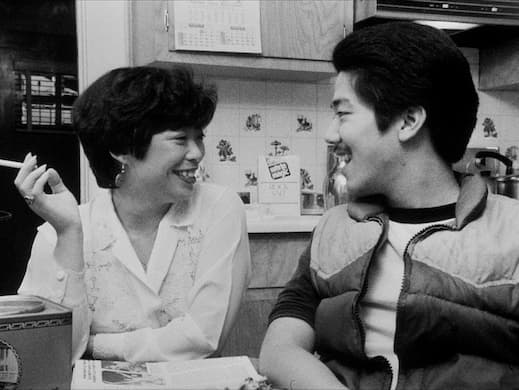40 Years After Its Release, ‘Chan Is Missing’ Feels Even Fresher
Director Wayne Wang’s solo debut, the first Asian-American movie to receive significant mainstream attention and wide distribution, features a lack of politesse that speaks of a less constrictive cultural moment.

Toward the beginning of “Chan Is Missing,” Jo (Wood Moy) and his nephew Steve (Marc Hayashi) meet a young lawyer (Judy Nihei) who is working on a treatise titled “The Legal Implications of Cross-Cultural Misunderstandings.” Without much prompting, she begins to rattle on about “culturally related assumptions” that exist between the police and the Chinese-American community.
Her observations aren’t without interest, but tell that to our heroes. Jo and Steve, both of whom work as taxi drivers, just wanted to stop for pancakes at Chester’s Delicious Food, a local greasy spoon. Instead, they’re given a breathless disquisition on how native Chinese-speakers “relate … seemingly unrelated objects to the matter at hand.” Jo and Steve have their patience tested by the lawyer’s increasingly convoluted line of logic. College graduates: What are you going to do with them?
This is but one of many hilarious scenes from director Wayne Wang’s solo debut, a film that is being feted with a week-long stay at the IFC Film Center in honor of its 40th anniversary. “Chan Is Missing” wasn’t only pivotal in establishing Mr. Wang as a filmmaker; it was significant for American cinema on the whole. His shambling tale of two guys looking for a friend is the first Asian-American movie to receive significant mainstream attention and wide distribution.
Decades after its release, “Chan Is Missing” retains its off-the-cuff, hangdog esprit. The movie has, in fact, become fresher if only because its lack of politesse speaks of a less constrictive cultural moment. In scene after scene, we watch a variety of characters — and what characters they are — cajole, kibitz, and banter. Whenever Jo, Steve, and his sister Amy (Laureen Chew) are seen chit-chatting at the kitchen table, the film takes on a bracing intimacy. This, you think, is how people really talk.
As critics and historians have long pointed out, the name listed in the title does double-duty, referring to Chan Hung, a character seen only in a photograph, and Charlie Chan, the fictional detective created by Earl Derr Biggers. Specialists in B-movie arcana will recognize several asides made about Charlie Chan during the run of the movie, and “Chan Is Missing” goes on to underline other popular conceptions about the lives and culture of Asian-Americans. Mr. Wang makes some pointed observations, but they’re couched in a down-home humanism. No idealogue, he.
“Chan Is Missing” isn’t much of a mystery. The plot, such as it is, concerns Jo and Steve tracking down a friend who’s absconded with some of their money. The resulting investigation is driven more by curiosity than retribution and, in the course of their travels, they discover that no one much knows or cares about Chan’s disappearance. Mrs. Chan (Ellen Yeung) has been separated from her husband for about a year, and can’t be bothered. Chan’s teenage daughter Jenny (Emily Woo Yamasaki) wanders in-and-out of the movie in the calm acceptance that, yeah, well, her dad is somewhere.
And so “Chan Is Missing” goes, meandering through the byways of San Francisco wherein we encounter a community center for Filipino seniors, a motormouth cook with a “Samurai Night Fever” T-shirt, and a lesson on assimilation centered on Sun Wah Kue’s twist on an American staple: “It doesn’t taste like any other apple pie if you eat it.” All of which is couched in the environs, alternately drab and homey, of a struggling middle class.
Mr. Wang’s film remains a prize, as affectionate, unpretentious, and cockeyed a valentine to “cross-cultural misunderstandings” as you could hope for.

